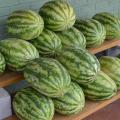Crops
Mississippi’s diverse soils, abundant rainfall, and moderate climate allow producers to plant a wide variety of agricultural crops. From iconic cotton to cutting-edge energy crops for biofuels, MSU scientists support the state’s agricultural commodities in a variety of ways.
Extension agents and specialists address growers’ immediate needs and challenges and help producers use university-based research to determine the most efficient production methods, best management practices, and most effective seed varieties for their unique needs.
For the most up-to-date information on the state’s agricultural crops, visit the Mississippi Crop Situation blog.
Publications
News
RAYMOND, Miss. -- Mississippi’s watermelon producers face a tough year as summer rains diminish what they had expected would be a good crop.
Mississippi State University will host a half-day grape workshop on July 11 for anyone interested in growing bunch grapes in the state.
Rainfall at well above normal accumulations is impacting the state’s row crops, mostly in a negative way.
Mike Brown, state climatologist with the Mississippi State University Department of Geosciences, said many areas of the state have had one and a half times the typical amount of rain for this time of year.
Success Stories
Fenton Pope looked around his native Covington County a quarter-century ago and saw what he believed was an alarming amount of farmland out of production.
For J. W. “Bill” McKie (pronounced Mackey), working for the Mississippi State University Extension Service was more than just a job—solving agricultural problems for Mississippians was McKie’s calling.







